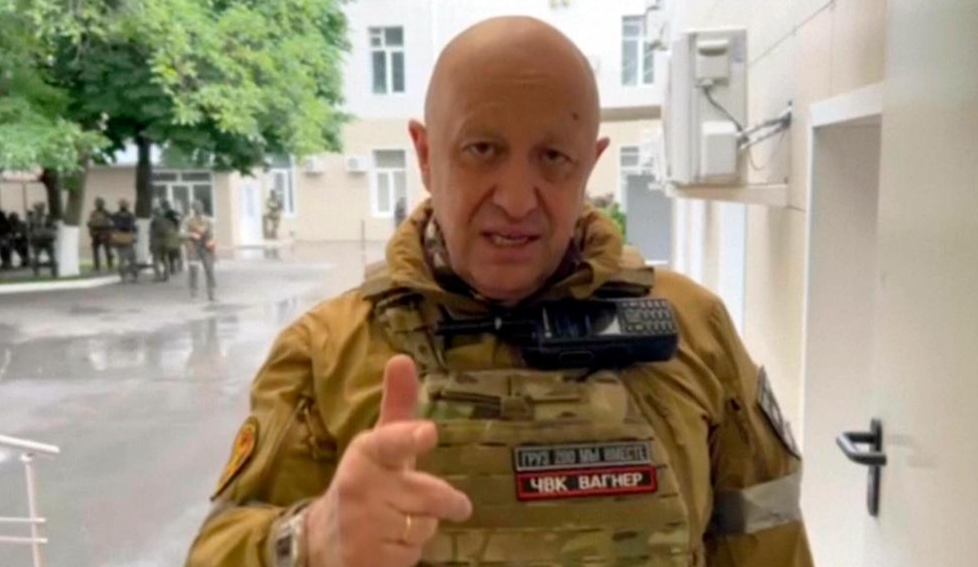
Wagner Group’s head Yevgeny Prigozhin
The past week has seen Algeria facing a battery of mainly unanswerable questions related to its relations with Russia and the latest events in that country. On the one hand, it is still facing repercussions in relation to President Abdelmadjid Tebboune’s state visit to Russia on 14-16 June (Algeria Politics & Security – 20.06.23). Then before most were even answered, the regime was faced with the 24 June ‘rebellion’ by Yevgeny Prigozhin’s Wagner Group mercenaries. Before the dust had even begun to settle around the reactions, especially from the West, to Tebboune’s state visit, questions regarding the implications of Prigozhin’s actions were being fired at the regime from all sides.
France’s official reaction to Tebboune’s state visit to Russia was initially not as antagonistic or negative as might have been expected. However, such magnanimity was not to last for long. For many parties in France, and especially on the right, the visit was seized upon by those who are calling for a hardening of bilateral relations with Algeria. For some of them, it was enough for them to conclude that President Emmanuel Macron’s policy of rapprochement with Algiers has failed. He is therefore under strong pressure to recalibrate his Algerian policy. For Algeria’s opponents Tebboune’s visit to Russia, and his lavish reception by President Vladimir Putin, was a snub to France and Macron.
If Tebboune’s apparent siding with Russia has lost him much goodwill in France, things could be worse for Algeria in Germany. When Germany’s Foreign Minister Annalena Baerbock met her counterpart Ahmed Attaf in Berlin on 22 June, she demanded that Algeria must clearly name Russia as the ‘aggressor’ in the war in Ukraine. She added that the two countries were ‘very far apart’ on the war, and noted that Germany had experienced up close how Russia attacked its European neighbour from one day to the next without any reason.
Even before of Prigozhin’s 24 June coup, it was evident that Tebboune’s visit to Russia had set back Algeria’s relations with both France and Germany. The situation with the US however was, and still is, less clear, which is largely because Washington has not yet made an official statement. There are various possible reasons but the most likely is that, although the US does not like the Algerian regime, it sees it as something of ‘a necessary evil’ that needs to be kept in place. In Washington’s view of the world the alternative is chaos as has happened in Libya, or a takeover by the people. Both are too ghastly to contemplate so US policy is to try and contain the Algerian regime but not destroy it.
The Wagner rebellion: the implications for Algeria
The key question is how the Wagner Group’s 24 June rebellion will affect Algeria. It is unclear but a number of pointers and implications are beginning to become clear.
The rebellion, coming barely a week after Tebboune’s visit, will also have weakened both Tebboune and General Saïd Chengriha’s Russophile wing of the army. One well-informed source said that, while he had put the chances of Chengriha being dismissed as Army Chief of Staff this year at 20% a month ago, he now put that possibility at 70%. For many Algerians, as well as the international community, Tebboune will be seen as having hitched his cart to the wrong horse.
What happens in Russia could have major implications for Algeria. After Tebboune’s visit it seemed clear that, despite his previous criticism of the Wagner Group in Mali, he had committed Algeria to helping Russia in the Sahel and especially Mali. The strong implications of Tebboune’s ‘New Strategic Partnership’ with Russia (Algeria Politics & Security – 20.06.23) is that it would support Moscow’s interests in Mali.
As our sister publication explained (Sahara Focus, June 2023) this support could have taken Algeria into disastrous situations, and especially because only a few days earlier the Malian junta had ordered the MINUSMA peacekeeping forces to leave the country. Statements from Foreign Affairs Minister Sergei Lavrov, and other indicators, suggest that Moscow will maintain the Wagner forces in Africa, albeit perhaps under a new command structure, possibly tied to the Defence Ministry. Lavrov has confirmed that Wagner will continue to operate in both Mali and the Central African Republic.
However, if Russia does take more direct control of the Wagner Group forces in Africa, and if Algeria is drawn into supporting them, the implications for both countries in terms of international law will be profound. The possible scenarios that could develop in Mali under such circumstances also pose potentially serious implications for Algeria’s own security.
Conversely, if the Wagner forces are withdrawn — and if the UN peacekeeping forces also do so as the Malian junta has insisted — the field will be left wide open to the jihadist forces of the État Islamique au Grand Sahara (EIGS) and Jama’at Nasr al-Islam wal Muslimin (JNIM), which could have huge security and geo-political implications for Algeria.
Besides any possible punitive actions against Algeria by the US and, less likely, the EU for seemingly siding with Russia, the main implications of Prigozhin’s rebellion for Algeria is likely to come from the Sahel and especially Mali. Although it is still unclear, we will be keeping a very close eye on the situation in the coming weeks and months.
This excerpt is taken from our Algeria Politics & Security weekly intelligence report. Click here to receive a free sample copy. Contact info@menas.co.uk for subscription details.


